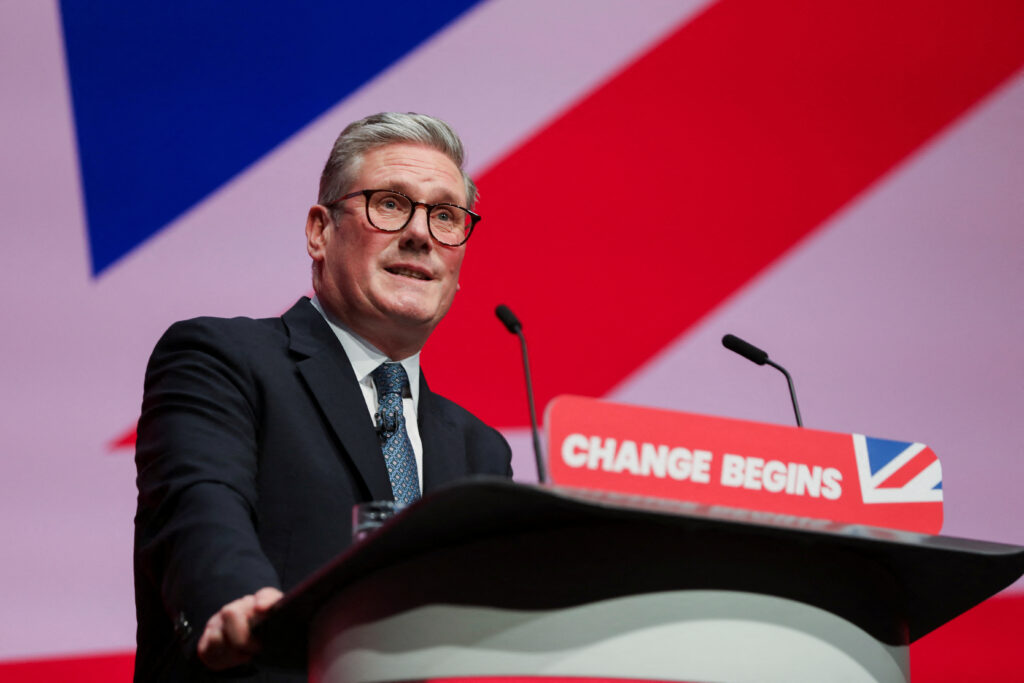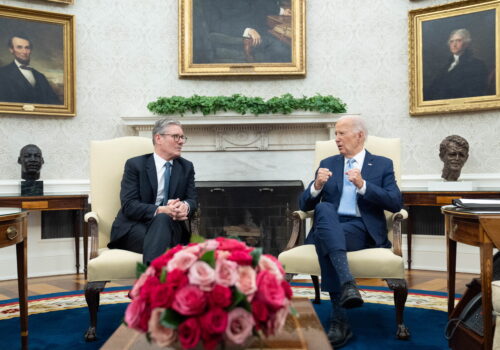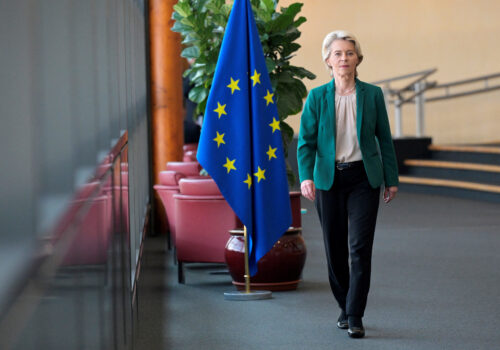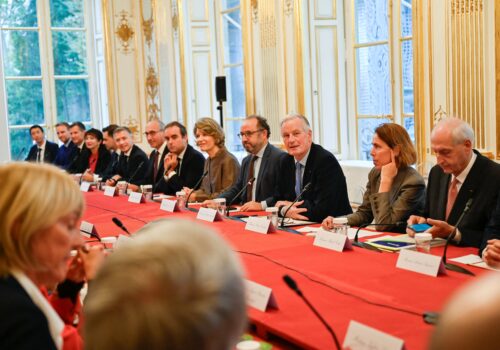LIVERPOOL—The United Kingdom’s ruling Labour Party converged on Liverpool for its annual conference last week, three months after its landslide election victory that swept Keir Starmer and his government into office after fourteen years out of power.
Yet the mood of the gathering of activists, representatives, and ministers was far from celebratory. The economic and political hole the United Kingdom finds itself in—and the dire international situation in the Middle East and Ukraine—cast a serious shadow over the four-day event.
For Starmer, this was an opportunity to set out his plans after a bumpy start to his premiership, during which he has had to deal with violent street riots in the summer over immigration, hostile media stories about his acceptance of gifts and donations from wealthy supporters, and reports of infighting among key aides.
But more fundamental both to the country’s future and to his government’s prospects is the overriding task of stabilizing the United Kingdom’s public finances and finding a route back to growth after a decade of economic sclerosis. Without this, his promises to boost Britain’s ailing health service, transition to clean energy, and accelerate affordable housebuilding will ring hollow.
In his keynote speech to the conference, the new prime minister said there were no “easy answers” to fixing the economy and stressed that clearing up what he has described as the “rubble and ruin” he inherited from the previous Conservative administration was “a long-term project” requiring controversial and unpopular decisions.
Taking unpopular decisions will test the patience and goodwill of voters and Labour’s own members of parliament and supporters.
One such decision already announced—to cut welfare payments to help all but the poorest pensioners with their winter fuel bills—has proved particularly controversial and unpopular, not least within his own center-left Labour Party. Further cuts to public spending and tax rises are expected in the government’s forthcoming budget later this month.
Starmer has seen his public approval ratings plummet as a result. But, with a commanding majority in Parliament, Starmer is showing himself to be a ruthless political leader in a hurry, willing to spend political capital early in the hope of securing dividends later.
The prime minister knows that he does not have long to show that his new government is making a positive difference in people’s lives, not least because he leads a country that voted for political change in July but was divided on what that that change should be.
He has suspended more than a dozen Labour members of parliament because of their opposition to cuts in welfare spending and—despite party activists voting in Liverpool last week for Labour to reverse his plans on winter fuel payments for pensioners—he is vowing not to “turn back.”
In his Liverpool speech, the prime minister was scathing about his Conservative predecessors for their “deliberate refusal to countenance tough decisions.” This, he claimed, not only contributed to the United Kingdom’s current economic predicament but further undermined the public’s faith in mainstream politics and politicians.
With smaller and more extreme political parties on the rise at the expense of the United Kingdom’s mainstream parties (the combined support for Labour and Conservatives in July was, at 47 percent, the lowest since 1945), Starmer is acutely conscious of a wider responsibility, as he explained at the Labour conference, “to show to the working people of this country that politics can be a force for good. Politics can be on the side of truth and justice. Politics can secure a better life for your family through the steady but uncompromising work of service.”
His determination to act quickly at home is matched by his impatience to act on the international stage, too. Since July, Starmer and his foreign minister, David Lammy, have embarked on an intense round of diplomatic activity to repair relationships and a reputation tarnished by a decade of Brexit, national introspection, and political instability.
Again, for Starmer, early action is designed to win longer-term political and economic dividends. So, by developing better relationships with the European Union and European neighbors, he hopes to secure a reduction in trade friction from former Prime Minister Boris Johnson’s Brexit deal, stem the flow of asylum seekers from crossing the English Channel in small boats, and unite the continent to provide Ukraine with the support it needs in its war with Russia.
Starmer is also investing heavily in the United States in the run-up to the November presidential election. Having not crossed the Atlantic once in his four years as leader of the opposition in the United Kingdom, the prime minister has undertaken three trips in less than three months to the United States.
While in New York at the United Nations General Assembly, he saw President Joe Biden and other world leaders to pledge a fresh declaration of support to Ukraine and, for the first time, met with former President Donald Trump in a clear sign that, whatever the pressures he may face domestically and internationally, he is determined to build a productive relationship with the Republican nominee if he wins the White House in November.
No one can argue that Starmer and his new government in the United Kingdom have not been busy in their first three months in office. But it’s an approach with risks both at home and abroad.
Taking unpopular decisions will test the patience and goodwill of voters and Labour’s own members of parliament and supporters. He has been accused of “talking Britain down” with his downbeat assessment of the country’s economic challenges but Starmer told his party in Liverpool that such criticism was like “water off a duck’s back.” His resolve will be severely tested in the months ahead as he faces even tougher, more challenging times.
On foreign policy, he has ruffled the feathers of some, not least in his stalled effort to win US and European support to allow Ukraine to use long-range missiles against targets inside Russia. He will also be under pressure from the European Union to make greater concessions on issues of people movement, trade alignment, and asylum burden sharing in return for a more productive post-Brexit relationship.
The United Kingdom appears to be under relatively stable political leadership for the first time in years. Yet the essential long-term challenges that the country faces remain: to build a strong economy, improve public services, and fashion a new strategic relationship with Europe and the world. Starmer is in a rush to make a difference, and it will be some time before the country can judge how successful he has been. In the meantime, expect his bumpy start to get even bumpier.
Ed Owen is a nonresident fellow of the Atlantic Council’s Europe Center and a former UK government adviser.
Further reading
Thu, Sep 12, 2024
As Starmer visits the White House, the US-UK ‘special relationship’ must look forward
New Atlanticist By Peter Westmacott
The UK prime minister’s meeting with the US president this week comes after a recent flurry of diplomatic activity between their countries, but more will be needed ahead.
Wed, Sep 18, 2024
What Washington needs to know about the makeup of the next European Commission
New Atlanticist By James Batchik, Jörn Fleck
The new appointments show the European Union to be an increasingly capable and willing trade and security partner to the United States.
Thu, Sep 26, 2024
France’s new government aims to calm the political storm. What will it mean for foreign policy?
New Atlanticist By Léonie Allard, Jean-Loup Samaan
Prime Minister Michel Barnier is likely to follow the path of President Emmanuel Macron, but the big question is whether the delicate political context in Paris will allow ministers to focus on crises in Ukraine and Lebanon.
Image: British Prime Minister Keir Starmer delivers his keynote speech at Britain's Labour Party's annual conference in Liverpool, Britain, September 24, 2024. REUTERS/Temilade Adelaja



